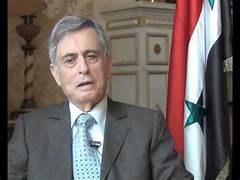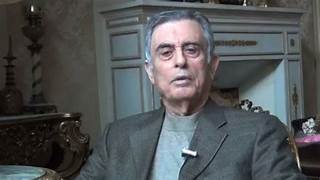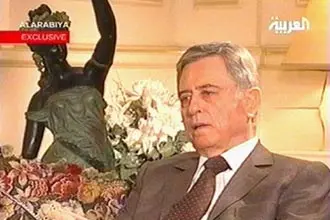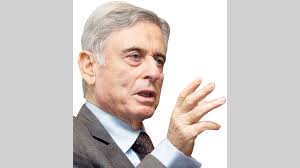Abdel Halim Khaddam, the former deputy president of Syria and leader of the opposition National Salvation Front, has declared his endorsement of international military strikes against his own country, similar to the situation in Libya. During an interview with Asharq Al-Awsat in Brussels, he accused the international community of employing double standards in their approach to the Arab revolutions. Khaddam also highlighted an ongoing global initiative, taking place through the United Nations Human Rights Council, to pass a resolution referring Syria to the International Criminal Court in The Hague, mirroring the events that transpired in Libya. This move aims to subject President Bashar Al-Assad and others to international justice. Nevertheless, Khaddam posed several thought-provoking questions. He inquired, “Is there an international agreement in place to shield Assad, who has supported Iran in Lebanon and Iraq? Does the international community intend to avoid prosecuting him to prevent a confrontation with Iran? Are there any connections in this regard?” Additionally, he pondered, “Is there a single justification for the international community to safeguard Assad? Why must the Syrian people bear the consequences?” He expressed that he continues to hear various statements and unanswered questions surrounding these matters.
- Prior to commencing the dialogue, you mentioned the presence of an international agreement to safeguard President Assad. However, there have been reports of US President Barack Obama intending to declare that President Assad has “lost his legitimacy.” Doesn’t this contradict the existence of the international agreement you referred to?
— If President Obama takes this step, it would be a positive development indicating the absence of such a deal. However, the current stance of the international community often raises perplexing inquiries. For instance: “Is there an international agreement in place to shield Assad, who has supported Iran in Lebanon and Iraq? Does the international community wish to refrain from prosecuting him to avoid a confrontation with Iran? Are there any connections in this regard? Is there a singular rationale for the international community to protect Assad? Why must the Syrian people endure the repercussions without any action being taken? We encounter various statements posing these questions, yet they remain unanswered.”
- However, there are international and American initiatives underway…
— The US administration has come to recognize the gravity of the situation in Syria, particularly following the recent interview of Rami Makhlouf (a Syrian businessman and relative of President Assad) in the “New York Times” newspaper. In his interview, Makhlouf unveiled the true strategy of the Syrian regime, which had previously claimed to be an opposition regime supporting resistance and steadfastness. What Makhlouf addressed to the Americans is that the stability of Israel is intertwined with the stability of Syria, revealing the regime’s deception and manipulation of Arab public opinion. Makhlouf attempts to convey to Israelis that their own stability is reliant on his regime’s stability and urges them to consider how they can assist him. However, such slogans do not instill concern in Israelis. Why should Israelis be worried about a Syrian regime that dispatches its planes to Deir ez-Zor, traversing the skies of Syria, yet refrains from launching missiles? Similarly, the regime sends planes to Ain Sahib, a mere 10 kilometers from Damascus, yet remains hesitant to fire a missile.
- Perhaps this is what Makhlouf intends to convey: “You should be concerned if we are no longer in power.” However, do you believe that the Assad family is responsible for everything that has befallen the Syrian people?
— The suffering endured by the Syrian people is a direct result of the dictatorial nature of the regime. This system is built upon authority, first with Hafez al-Assad and now with his son. Thus, the responsibility lies with the family as they hold the reins of power. No member of the Assad family can claim innocence regarding the misuse of their influence to pursue personal objectives and oppress the people.
- Some argue that it is the doing of the old guard…
— Where is this old guard located?
- There are individuals, such as Farooq al-Shara…
— Farooq al-Shara is unable to take any action. What role does Farooq al-Shara play?
- By the way, there has been talk about the absence of Sharia in recent days, despite his pictures appearing on some occasions…
— The pictures circulating of Farouq al-Shara and Bashar al-Assad during the Martyrs’ Day celebrations are inaccurate. Neither Sharia nor Bashar attended the event. The images shown on Syrian television are from last year’s Martyrs’ Day commemoration, not this year’s.
- Has Assad eliminated the old guard?
— There was no old guard to begin with. Does anyone believe that Farouq al-Shara holds any authority? The people of his hometown and city (Daraa) have been killed, persecuted, and displaced. What has he done for them? If he possesses influence, it has amounted to nothing. He remains confined to his house. It is a major irony to suggest the existence of an old guard and their supposed influence.
- The difference between the two cases: Libya and Syria…
— The situations are the same. Bashar al-Assad is even aiding Muammar Gaddafi by sending pilots and technicians to attack the rebels. What is happening in Libya is also happening in Syria, where the regime is using the army to suppress protesters. In Egypt, the situation is different as President Mubarak did not resort to using force or the army against protesters. Although some regrettable incidents occurred, it cannot be said that Mubarak employed excessive force.
The Egyptian army is a national army, whereas in Syria, the army is not the People’s Army; it represents the ruling sect. The majority of army officers belong to the Alawite community in Horan, Damascus and its countryside, Homs, Hama, Deir ez-Zor, Qamishli, and Banias. There is not a single officer from outside the sect.
- Why has there been military intervention in Libya but not in Syria?
— The current international actions are inadequate and ineffective. Imposing sanctions on five individuals by the United States is of no value, as these officials have no significant presence and do not travel abroad. Therefore, sanctions hold no weight. If the international community fails to intervene and take decisive measures to assist the Syrian people and ensure their safety, the Syrian people will have no choice but to engage in a battle for national liberation. The current regime is not a national one, and the Syrian people need to fight to regain power. If the international community remains silent in the face of the Syrian crisis, there will be grave repercussions and consequences not only for Syria but for the entire region.
- Are you advocating for military strikes against Syria, similar to what is happening in Libya?
— Yes, that is our stance. We do not want the international community to apply double standards to the Arab revolutions.
- Who is best suited to lead Syria after the change?
- The Syrian people, who constitute a population of 23 million, are capable of producing competent leaders. If you randomly select ten individuals from the street, you will find them more capable and qualified than the current regime.
- Will the leadership come from abroad or from within?
- We prefer it to emerge from within Syria. Syrians living abroad do not have the right to lead the Syrian people. The young individuals who are leading the protests in cities and rural areas, enduring hardships and casualties, should be the ones leading the country. Syrians abroad should support and assist them, not replace them. I have made this statement before, and I reiterate it now: I personally have no aspirations for authority. I will not return to power. I believe the role of my generation has come to an end. It is now the turn of these younger generations.
- Is the Syrian opposition currently divided?
- The revolution in Syria is not led by the Syrian opposition. It is the youth of Syria who initiated and drove the revolution, with the support and participation of the people. All opposition parties in Syria are aligned with this revolution. Therefore, it is not a creation of a specific party or group. It is a youth-led revolution, not a party-based revolution.
- In the context of the Egyptian scene, we did not witness the emergence of a single leader or symbol of the revolution.
— The situation in Egypt was different. Having a single leader or a symbolic figure would have undermined the collective power of the people. It is important to hold free elections, where the Egyptian people can elect their representatives and choose their government. Egypt needs to return to democracy, and the same principle applies to Syria. Unfortunately, many of the revolutionary regimes that were established in the Arab world under the banner of reform and change have brought their people into painful situations and must now heed the will of their people.
- You are currently in Brussels. Have you had any meetings with individuals from the European Union?
- I have not had the opportunity to meet anyone formally, but I have occasionally held meetings in Brussels with members of parliament and engaged in dialogues with them.
- Are you conveying a message to the EU?
— Yes, a message has been sent to the EU, as well as to several European presidents and the heads of the permanent members of the Security Council.
- What does the latest message entail?
— The message primarily concerns the situation in Syria and emphasizes the urgent need for the international community to intervene and take measures to save the Syrian people.
- Is the progress on the international front satisfactory or slow?
- As mentioned earlier, the progress is slow, but there are ongoing efforts through the United Nations Human Rights Council to pass a resolution referring the Syrian file to the International Criminal Court in The Hague, similar to the actions taken in Libya. This would lead to a trial for President Bashar Al-Assad and others involved, ensuring they face international justice.
- Do you possess lists of individuals directly responsible for crimes in Syria?
- Yes, we have compiled a list of 60 officials who are directly involved in carrying out the killings.
- Do you possess evidence to support these claims?
— The evidence is available, supported by the facts on the ground, including videos and insider information. We have called for the establishment of an international commission of inquiry to visit Syria and gather evidence from the people. However, the Syrian authorities have refused this request, as they are aware that such a commission would uncover the realities on the ground.




